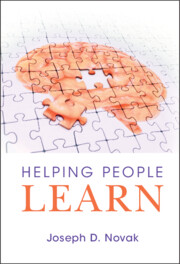
-
Select format
-
- Publisher:
- Cambridge University Press
- Publication date:
- June 2022
- June 2022
- ISBN:
- 9781108625982
- 9781108470896
- 9781108456838
- Dimensions:
- (229 x 152 mm)
- Weight & Pages:
- 0.426kg, 196 Pages
- Dimensions:
- (229 x 152 mm)
- Weight & Pages:
- 0.29kg, 196 Pages
- Subjects:
- Psychology, Cognition, Educational Psychology
You may already have access via personal or institutional login- Subjects:
- Psychology, Cognition, Educational Psychology
Book description
Educational theory and practice are historically influenced by the view of behavioral psychologists that learning is synonymous with behavior change. Helping People Learn argues for the practical importance of an alternate view, that learning is synonymous with a change in the meaning of experience. Based on the foundations of cognitive psychology and constructivist epistemology, this book presents a science of education that can guide the development of successful and meaningful educational programs. It serves as a sequel to the best-selling Learning How to Learn and includes ideas developed through the author's research and training programs conducted over the past thirty years. It emphasises the power of the knowledge representation tool 'concept maps', designed to facilitate meaningful learning and creativity. This book capitalises on the advances in technology and is of interest to students, professionals and researchers in educational psychology and learning theory.
Reviews
‘Joe Novak has made an enormous contribution to the field of education, specifically in helping people to learn in both academic and corporate settings. This highly personal account gives a fascinating behind-the-scenes insight to the people who have contributed to Joe’s research over the years.’
Ian Kinchin - Professor of Higher Education, University of Surrey, UK
‘In this fascinating book, Joe Novak reflects on his long and illustrious career advancing understanding of teaching and learning. He recounts the origin, influences, and impact of his work on concept mapping. He describes how he brought these ideas to industries like Proctor and Gamble, to government agencies like NASA, and to organizations involved in national security. Novak summarizes the research and insights leading to his commitment to meaningful learning, culminating in his theory of education. Poignant anecdotes capture his commitment to family. In Helping People Learn, Novak offers a plethora of rich, varied examples of successful teaching and learning that will interest a broad audience.’
Marcia C. Linn - Evelyn Lois Corey Professor of Instructional Science, University of California, Berkeley, USA
Contents
Metrics
Altmetric attention score
Full text views
Full text views help Loading metrics...
Loading metrics...
* Views captured on Cambridge Core between #date#. This data will be updated every 24 hours.
Usage data cannot currently be displayed.
Accessibility standard: Unknown
Why this information is here
This section outlines the accessibility features of this content - including support for screen readers, full keyboard navigation and high-contrast display options. This may not be relevant for you.
Accessibility Information
Accessibility compliance for the PDF of this book is currently unknown and may be updated in the future.


